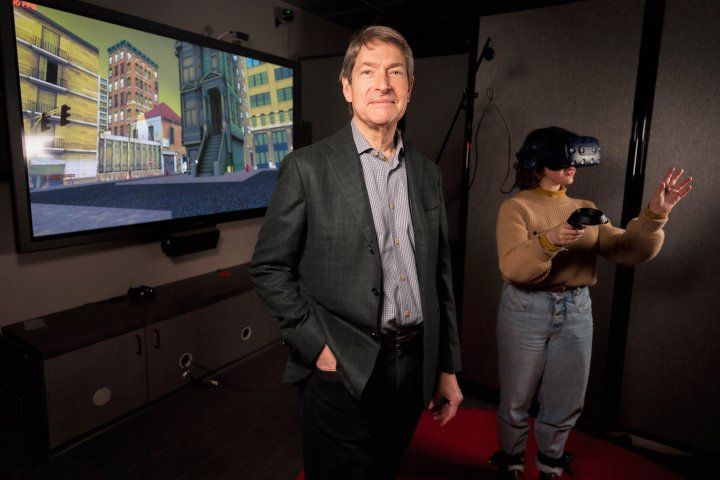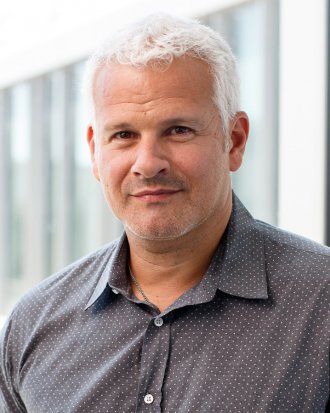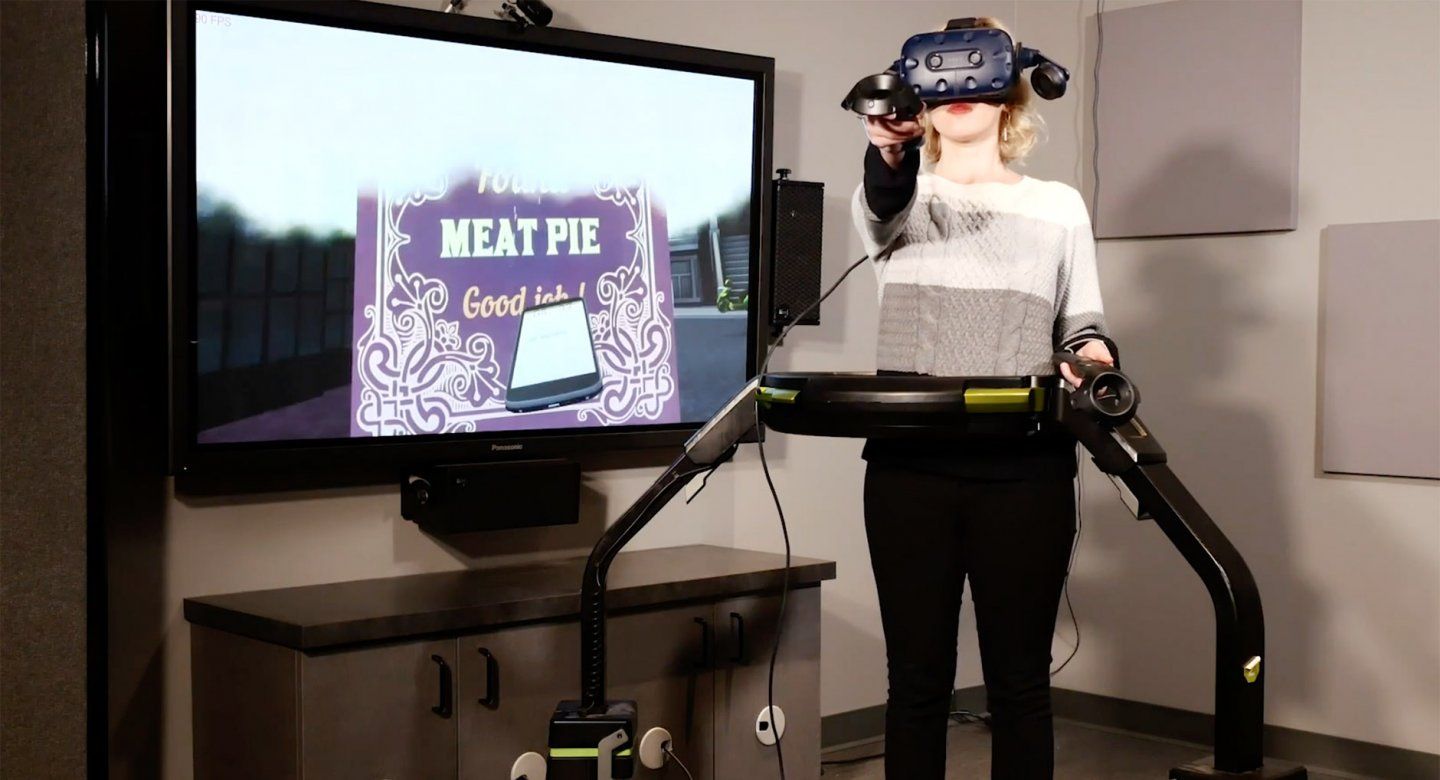Playing Virtual Reality Video Game May Boost Seniors’ Memory
A decline in memory is a harsh reality for some people as they age and may even mark the start of dementia, such as Alzheimer’s disease. But new research suggests that time spent in virtual reality – through a video game – could help older adults restore their memory into better shape.
Scientists at UC San Francisco’s Neuroscape brain research center have developed a first-of-its-kind virtual reality video game that can improve memory in healthy, older adults, according to a study published Jan. 28 in Scientific Reports.

Peter Wais (left), PhD, tested a special virtual reality program to see if it would improve memory in older adults. Photo by Maurice Ramirez
Eventually, researchers hope such games could serve as a digital intervention in older adults with “mild cognitive impairment,” defined as a noticeable decline in memory and control of attention. According to the Alzheimer’s Association, 15 percent to 20 percent of people age 65 or older have mild cognitive impairment. Many drugs have been tested, but none has shown a sustained benefit for long-term memory.
In the new, immersive game, called Labryinth-VR, players don a head-mounted virtual reality display and navigate through “neighborhoods” of increasing size and complete errands of increasing complexity as the game progresses through 42 levels. Importantly, players walk in place and move their bodies as they navigate the game, gaining physical exercise that can increase cerebral blood flow associated with improvement in general cognitive performance, the researchers said.
Researchers saw an improvement in an important type of long-term memory – high fidelity memory, the ability to tell apart new objects from very similar ones viewed before.
The study involved 48 cognitively average older adults, with a mean age of 69 years. Half of the participants played Labyrinth-VR, while the other half, the placebo group, played regular commercial video games not expected to have beneficial effects on memory. All participants played for 12 hours over four weeks.
Participants were scored on high fidelity memory using a test that assessed recollection of previously seen objects. Those who played Labyrinth significantly improved their high-fidelity memory relative to the placebo group. In fact, their high-fidelity memory was on par with that of players in their 20s, based on prior testing of various demographic groups.
These results suggest that after Labyrinth training, 75 out of 100 cognitively average older adults would perform like average college-aged players. To put the improvement into perspective, typically only about five of 100 cognitively average older adults have high fidelity memory at the level of average college-aged students, explained Peter Wais, PhD, assistant professor of neurology and co-author of the study.
An important finding in the study is that players improved their high fidelity memory even though the game didn’t focus on high fidelity memory tasks.
“We didn’t train them and then test them on the same highly detailed memory tasks – we trained them on navigating and getting better in moving through this virtual environment and then the benefits we saw were on other tests of high fidelity memory,” said Adam Gazzaley, MD, PhD, founder and executive director of Neuroscape.
“That shows you that memory systems engaged with learning the virtual environment are linked with memory systems we use to discriminate small differences between previous experiences and new ones at hand.”

Adam Gazzaley, MD, PhD
Gazzaley’s lab, which evolved into the Neuroscape Center, has been developing treatments for neurological and psychiatric conditions that go beyond pills and molecules. The digital tools developed at Neuroscape represent the marriage between neuroscience and game technology. Labyrinth-VR has been in development for over three years and is part of a portfolio that also includes a game for kids with attention deficit hyperactivity disorder (ADHD). Called EndeavorRx, it was the first video game approved by the U.S. Food and Drug Administration (FDA), in June 2020, and created a new class of digital therapeutics. Labyrinth is the first virtual-reality game developed at Neuroscape.
“The hypothesis was if we could create a very rich environment that required complex spatial navigation that we would improve not just the ability to navigate space, but also other memory processes that also depend on the hippocampus,” Gazzaley explained.
Aside from high fidelity memory, participants did not improve significantly on other memory tasks evaluated, such as a “walk test” that assessed recall of landmarks seen on a walk around the block. But researchers say it may be possible to boost performance on this measure, too, by tweaking the way the game is administered.
They plan to test whether more hours playing the game would help participants who learn the virtual neighborhoods more slowly.
“A simple analogy would be that some people might need more hours at the gym to achieve a certain level of their strength capability than others whose physical strength may pick up more rapidly,” Wais said.
UCSF researchers anticipate a rigorous approach for further development of Labyrinth-VR, including teasing apart the effects of movement and the virtual reality parts of the game.
A new study of Labyrinth, started in 2020 but delayed by COVID-19, is now getting back on track, with results expected this year, said Wais. The model presented in the Scientific Reports study involved the use of head-mounted virtual reality equipment and needed to be used in the lab. One arm of the new study assesses Labyrinth without virtual reality and the other will evaluate Labyrinth with participants seated instead of walking.
A tablet version is also in the works. The coronavirus pandemic has shown the importance of medical care that is available remotely and head-mounted virtual reality display equipment is not readily available at home. A 2D tablet version, which can convey a sense of depth perspective, has the potential to dramatically improve access to a Labyrinth-style therapeutic from the comfort of home.
“We want to understand benefits of the tablet version so we can accelerate our research at home,” Gazzaley said.
Disclosure: Adam Gazzaley is co-founder and chief science advisor of Akili Interactive, a company developing therapeutic video games.
